Apartment Living in New Zealand
Catherine Foster
Penguin Random House
$50
Reviewed by Claire Smith
 The days of the ‘three-bedroom on a quarter-acre section’ may not be entirely gone, but they’re certainly fading fast. And in their wake, comes the new age of smaller, more efficient living spaces.
The days of the ‘three-bedroom on a quarter-acre section’ may not be entirely gone, but they’re certainly fading fast. And in their wake, comes the new age of smaller, more efficient living spaces.
According to the NZ Herald, more than 150 apartments are now sold every month in Central Auckland. But it’s not just Auckland experiencing an apartment boom.
Wellington, Christchurch, and larger regional centres such as Tauranga have all seen increases in apartment building and sales. Just as her first book, Small House Living, tuned into the trend for New Zealanders to build smaller homes, Catherine Foster’s new book embraces the diversity of apartment-style living, celebrating an emerging style of housing that delivers on convenience, affordability, and a more urban way of life.
Attracting Birds and Other Wildlife To Your Garden
Gordon Ell
New Holland
$35
Reviewed by Claire Smith
Be in to win this book. Enter the MCD competition online here.
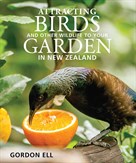 If, like me, you love to wake up to the sound of tuis singing in the morning, or watch pairs of kereru as they dip and dive like aerobatic aircraft, then you may be wondering how to encourage more of these beautiful birds into your garden.
If, like me, you love to wake up to the sound of tuis singing in the morning, or watch pairs of kereru as they dip and dive like aerobatic aircraft, then you may be wondering how to encourage more of these beautiful birds into your garden.
This beautifully illustrated book is a practical guide to attracting birds and other wildlife, such as hedgehogs, butterflies, and lizards, into your garden.
You’ll find pages full of helpful tips, expert advice, and clever insights from naturalist Gordon Ell. My takeaway tip—tuis are attracted to red, so a red bowl with a sugar water (one cup of sugar to one litre of water) is a great way to encourage these fabulous birds into your garden.
Jake Bailey: What cancer taught me
Jake Bailey
Penguin Random House
$30
Reviewed by Laura Batten
 I remember the first time I saw Jake Bailey speak at Christchurch Boys' High School Prize Giving on my television in 2015.
I remember the first time I saw Jake Bailey speak at Christchurch Boys' High School Prize Giving on my television in 2015.
He had only just begun chemo for Burkitt’s non-Hodgkin’s lymphoma, so he was gaunt, ghostly, and wide-eyed, making me feel dumbstruck and sorry for his situation. Yet, as he spoke, his courage and ambition and love for life was obvious and absolutely inspiring.
Reading Jake Bailey: What cancer taught me brought together the full story, from the very beginning of his diagnosis through to his remission.
He offers not only a perspective on dealing with cancer but also the importance of persistence and living life in the present because tomorrow is never guaranteed.
Refreshing, sweetly humoured, and always to the point, I am, as well as New Zealand, extraordinarily thankful that Jake got to share his story.
One of my favourite quotes from the book: “If you start your day with the outlook of it being another day that you’re lucky to have, very little can go wrong.”
Selfie
Will Storr
MacMillan Publishers
$23.99
Reviewed by Claire Smith
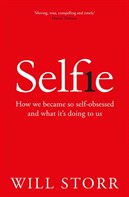 I picked up Selfie with the intention of having a quick scan, but was quickly captivated and found myself unable to put it down.
I picked up Selfie with the intention of having a quick scan, but was quickly captivated and found myself unable to put it down.
The book explores how we wound up living in an age of perfectionism—one in which we’re supposed to be slim, rich, happy, and have loads of friends—and why it’s taking such a toll on us. In the first chapter of the book, The Dying Self, author Will Storr begins to explore the link between unprecedented social pressure and the worrying increase in depression and suicide rates.
From there, he takes us on a journey back in time—from Ancient Greece through the Christian Middle Ages and eventually to modern-day America where today’s youth are purportedly in the grip of an epidemic of narcissism—to answer the question of how this ideal of perfection came to be and how we can break its spell.
A captivating, well-researched read that goes deep into the human psyche.
Teenagers, The Rise of Youth Culture in New Zealand
Chris Brickell
University Press
$49.99
Reviewed by Claire Smith
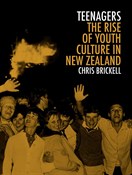 From the ‘flappers’ of the 1910s and 20s to the rock ‘n rollers of the 50s, author Chris Brickell takes us inside the lives of young New Zealanders of days gone by.
From the ‘flappers’ of the 1910s and 20s to the rock ‘n rollers of the 50s, author Chris Brickell takes us inside the lives of young New Zealanders of days gone by.
Through their diaries and letters, photographs and drawings, we meet teen Kiwis as they transition from children to adults. Brickell delves into the stories of our parents, grandparents, and beyond, bringing to life the large-scale changes in our society: the rise and fall of domestic service, the impact of compulsory educations, the movement of Pakeha and Maori from country to city, and the rise of consumer culture and popular psychology.
Teenagers provides an intimate and evocative insight into the lives of young people and the history of New Zealand.
Wildboy: To the Edge and Back
Brando Yelavich with Nicola McCloy
Penguin Random House
$35.00
Reviewed by Steve Atkinson
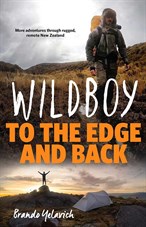 Brando (aka Wildboy) is back at it again, as he attempts a circumnavigation of Stewart Island. New Zealander’s seem to have taken this guy to heart and his exploits are closely followed on social media and the occasional TV news stories.
Brando (aka Wildboy) is back at it again, as he attempts a circumnavigation of Stewart Island. New Zealander’s seem to have taken this guy to heart and his exploits are closely followed on social media and the occasional TV news stories.
But then, who wouldn’t like this guy? He often wears his heart on his sleeve and when he pops up, it’s almost like catching up with a relative or a well-known character from Shortland Street.
On the plus side, he’s much more likeable than some fictional TV character and none more so than on this trek across New Zealand’s largest inhabited island south of Invercargill. The book is an interesting read and told with Wildboy’s distinctive honesty and storytelling skills.
Hopefully, our intrepid explorer’s travels on Stewart Island may encourage others to follow in his footsteps—literally.
Men Without Women
Haruki Murakami
Penguin Random House
Reviewed by Esha Chanda
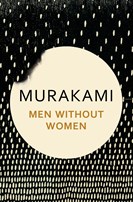 Tales spun from Murakami’s wonderfully weird imagination featuring cool cars, cats, jazz music, Shinto spirits, and lost love come together in his latest book. The 68-year-old Japanese author blends myth, magical realism, and allegories. Murakami has a way with words that draws you into the stories he so masterfully creates. The charm lies in that simple, uncluttered manner in which word after word is written to form sentences that eventually fill the pages.
Tales spun from Murakami’s wonderfully weird imagination featuring cool cars, cats, jazz music, Shinto spirits, and lost love come together in his latest book. The 68-year-old Japanese author blends myth, magical realism, and allegories. Murakami has a way with words that draws you into the stories he so masterfully creates. The charm lies in that simple, uncluttered manner in which word after word is written to form sentences that eventually fill the pages.
I have read more than a dozen of Murakami’s published works and was also the first in line to see him live at the Auckland Writers Festival in 2015 (yes, I am a fan), and his latest collection of short stories was as much a delight to read as was Sputnik Sweetheart—my introduction to the eccentric world of Murakami. At the heart of the collection lies the recurring themes of loneliness—seven wounded stories of men without women.
But unlike what the name of the book would suggest, it’s not the absence of women but the presence of female characters who form the basis of the narration in each of the men’s lives—an old actor mulling over the love affair of his dead wife; a cosmetic surgeon who stays away from falling in love until he eventually does; a divorced man who starts a jazz bar at the top of his aunt’s home; and—as an ode to Kafka—Gregor Samsa, who finds himself transformed from an insect into a man, thrown in an unfamiliar world and is then introduced to a hunchbacked woman who ignites his desires.





